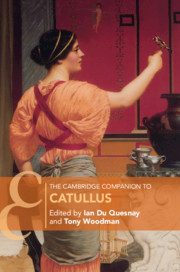Book contents
- The Cambridge Companion to Catullus
- The Cambridge Companion to Catullus
- Copyright page
- Contents
- Notes on Contributors
- Preface
- Introduction
- Chapter 1 Situating Catullus
- Chapter 2 Literary Liaisons
- Chapter 3 Catullan Intertextuality
- Chapter 4 Gender and Sexuality
- Chapter 5 Catullan Themes
- Chapter 6 Language and Style
- Chapter 7 Catullus and Metre
- Chapter 8 Catulli Carmina
- Chapter 9 Catullus and Augustan Poetry
- Chapter 10 Rewriting Catullus in the Flavian Age
- Chapter 11 The Manuscripts and Transmission of the Text
- Chapter 12 Editions and Commentaries
- Chapter 13 Catullus in the Renaissance
- Chapter 14 Catullus and Poetry in English since 1750
- Abbreviations and Bibliography
- Index Locorum
- General Index
Chapter 10 - Rewriting Catullus in the Flavian Age
Published online by Cambridge University Press: 09 April 2021
- The Cambridge Companion to Catullus
- The Cambridge Companion to Catullus
- Copyright page
- Contents
- Notes on Contributors
- Preface
- Introduction
- Chapter 1 Situating Catullus
- Chapter 2 Literary Liaisons
- Chapter 3 Catullan Intertextuality
- Chapter 4 Gender and Sexuality
- Chapter 5 Catullan Themes
- Chapter 6 Language and Style
- Chapter 7 Catullus and Metre
- Chapter 8 Catulli Carmina
- Chapter 9 Catullus and Augustan Poetry
- Chapter 10 Rewriting Catullus in the Flavian Age
- Chapter 11 The Manuscripts and Transmission of the Text
- Chapter 12 Editions and Commentaries
- Chapter 13 Catullus in the Renaissance
- Chapter 14 Catullus and Poetry in English since 1750
- Abbreviations and Bibliography
- Index Locorum
- General Index
Summary
The Flavian Age marked a decisive political break with the Julio-Claudian past. And yet Flavian literature has been repeatedly defined through a sense of epigonality, one that it itself cultivated, as Hinds observes. But, as Hutchinson comments of modern European literature, which also defines itself through ‘an anxiety of lateness’, backward-looking paradoxically can be associated with forward-thinking; lateness is one of the animating impulses of aesthetic creation. I shall argue here that, despite their different political and social conditions, Catullus was a foundational author in the development of the short poem for the Flavian poets Martial and Statius and their close contemporary Pliny the Younger, whose political career began under Domitian. All three authors raise the question of the cultural status of a form of poetry that from Catullus onwards was often described as lusus (‘play’) or iocus (‘jest’).
- Type
- Chapter
- Information
- The Cambridge Companion to Catullus , pp. 242 - 262Publisher: Cambridge University PressPrint publication year: 2021

